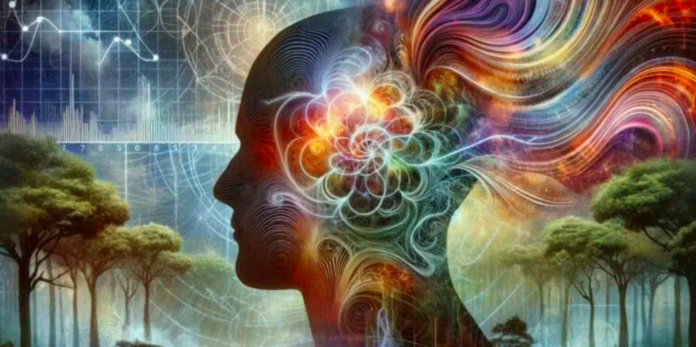Scientists examine whether ayahuasca ceremonies are linked to changes in narcissistic traits
A three-month study of participants in ayahuasca rituals found that these individuals self-report small decreases in narcissism after these ceremonies. However, reports from the participants peers did not corroborate these changes. The study was published in the Journal of Personality Disorders.
Ayahuasca is a psychoactive brew traditionally used by indigenous Amazonian cultures for spiritual and healing purposes. It is commonly made from the Banisteriopsis caapi vine and the leaves of the Psychotria viridis or other plants containing dimethyltryptamine (DMT). The combination of these plants creates a powerful hallucinogenic experience when ingested.
Ayahuasca is typically consumed during ceremonies, often led by experienced shamans. The ceremonies involve drinking the brew in a ritualistic setting, aiming to induce altered states of consciousness, self-discovery, and spiritual insights, as well as potential healing on physical and emotional levels.
Ayahuasca consumption has become increasingly popular in Western countries as well during the past several decades. In the West, it is often associated with the Santo Daime Church, a syncretic spiritual tradition that incorporates elements of Christianity, indigenous Amazonian practices, and the ritualistic use of ayahuasca. The psychedelic brew has also been touted by celebrities, such as American football quarterback Aaron Rodgers and actress Megan Fox.
Many recent studies indicated that, under controlled use conditions, psychedelics substances can be used to improve symptoms of various psychological disorders including depression, PTSD, and others. Study author Brandon Weiss and his colleagues wanted to explore whether ceremonial use of ayahuasca may have effects on narcissism. These authors note that ayahuasca ceremonies “can produce profound psychological experiences of awe, clarity, love, and heightened introspective capacity that have been linked to decreases in trait neuroticism.”
The study involved 314 adults attending ayahuasca ceremonies at three retreat centers in Peru and Costa Rica. All participants were required to be at least 18 years old. Those with a personal or family history of psychotic disorders were also excluded from the study.
Participants were recruited through emails sent two weeks prior to the start date of their reservation at an ayahuasca retreat center. As compensation for participation, researchers offered them a report detailing their personality changes and entry into a raffle for a week-long retreat at one of the ayahuasca centers, valued at $1580.
The researchers required participants to complete three surveys, offering an additional $20 or $30 for each. These surveys were completed eight days before their visit to an ayahuasca retreat center, during their stay, and three months after their retreat ended. The surveys included assessments of narcissism, using tools like the Narcissistic Personality Inventory, Psychological Entitlement Scale, and a composite derived from the five-factor model personality facets. Additionally, 110 informants, who were peers of the participants, completed these assessments at the beginning and three months after the retreat concluded.
Additionally, participants completed assessments of the dissolution of the ego during the acute effects of ayahuasca (the Ego Dissolution Inventory), mystical aspects of their experience (the Mystical Experience Questionnaire), suggestibility (the Multidisciplinary Iowa Suggestibility Scale – Short), expected change in personality as a consequence of ceremonies, and of lifetime use of psychedelic compounds.
Self-reported measures of narcissism indicated a minor decrease in the sense of entitlement and willingness to exploit others for personal gain. Conversely, the tendency to seek and assert authority or leadership positions showed a slight increase on average at the three-month follow-up compared to before the retreat.
No changes were observed in grandiose narcissism. While some self-reported overall narcissism scores decreased slightly, informant reports indicated no change in participants’ narcissism. Six percent of participants reported negative health side-effects from the ceremonies, including difficulty relating to others, adverse subjective experiences during ceremonies, distressing dreams, brain fog, auditory hallucinations, and difficulty concentrating, among others.
“Therapeutic effects on narcissistic antagonism and an FFM-based NPD [five-factor model based narcissistic personality disorder] proxy measure were small in size where present, and mixed. An observed effect on agentic extraversion was similarly small in size. These results provide modest and qualified evidence for the possible relevance of psychedelic-assisted therapy to the Antagonistic Externalizing spectrum of psychopathology. With respect to the clinical implications of this work, our results are considered sufficiently substantive to warrant further investigation,” study authors concluded.
The study makes an important contribution to the scientific understanding of the psychological consequences of ayahuasca use. However, it should be noted that study participants were effectively self-selected for participation in the study and the study design did not include a control group, while collecting data only at three time points. Due to this, no cause-and-effect conclusions can be derived from the study results and it remains unknown whether the findings could be generalized to other ayahuasca users.
The paper, “Examining the Therapeutic Effect of Ceremonial Ayahuasca on Narcissistic Personality and Antagonistic Externalizing in Adults”, was authored by Brandon Weiss, Chelsea Sleep, Joshua D. Miller, and W. Keith Campbell.

